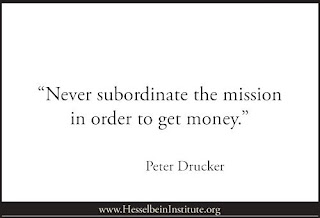This week in a two-day training session with board members and CEOs from 12 nonprofit boards, participants were hammering out their unique governance philosophies. It's not an easy task because the options in the governance library are numerous and often contradictory:
• Some boards prefer John Carver's Policy Governance® approach
• Other boards are very hands-on (CEOs often label it, “micro-managing”)
• A few are "boards" in name only
• Organizations led by founders tend to have cheerleader boards
• Far too few boards practice generative thinking-type governance
And interestingly, a significant swath of supposedly faith-based boards will lean on the language and literature of secular philosophies of leadership and governance. Their processes and practices (when closely examined) borrow heavily from earthly-oriented philosophies about people, money, and outcomes—versus an eternity-oriented understanding of leadership, sin, salvation, generosity, prayer, and discerning God's voice and direction.
So I was not surprised on Wednesday, when a ministry CEO told us he once had a board member describe his role this way:
"I'll write the check. You do the work."
Wow! Sounds tempting—especially if the check has lots of zeros. Imagine—a board member who is willing to write big checks and won't micro-manage the CEO.
What's the downside? Where do I start? First, as Peter Drucker cautioned leaders: "Never subordinate the mission in order to get money."
Your governance philosophy, if thoughtfully and prayerfully crafted, will shine a bright light on any and all inappropriate rationales for inviting "governance pretenders" onto your board.
I know. I know. It's tempting to make an exception. But when someone confesses—up front—that they will give money, but not DO the hard and deliberative work of a board member, run the other direction. Fast.
Counterfeit money and counterfeit board members have the same value.
I was blessed that our CEO colleague immediately knew that this checkbook-wielding board member was out of alignment with best governance practices. Imagine someone saying—more literally—“I’ll write the check. You’re not accountable to your board.”
For more on this important subject, read “Chapter Two: The Lies of the Enemy—Three Temptations We All Face,” in The Choice: The Christ-Centered Pursuit of Kingdom Outcomes, by Gary G. Hoag, R. Scott Rodin, and Wesley K. Willmer.
QUESTION: Does your governance philosophy illuminate inappropriate approaches to Christ-centered governance?

No comments:
Post a Comment